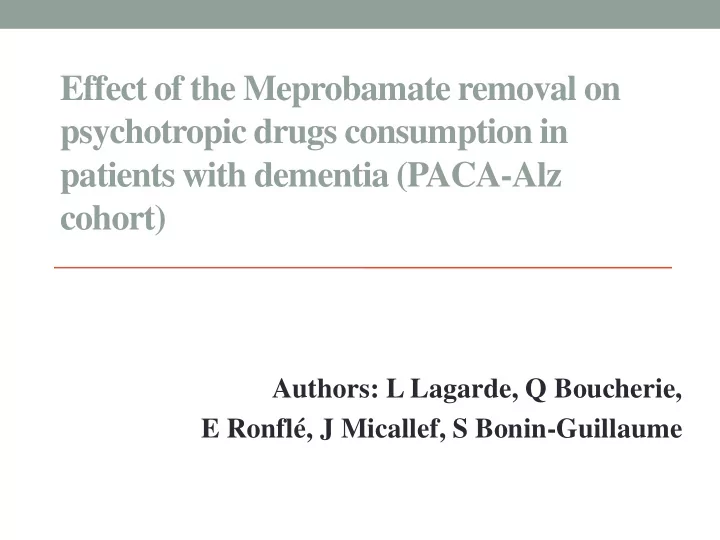

Effect of the Meprobamate removal on psychotropic drugs consumption in patients with dementia (PACA-Alz cohort) Authors: L Lagarde, Q Boucherie, E Ronflé, J Micallef, S Bonin-Guillaume
• No conflict of interest
INTRODUCTION • Behavioral and psychotic symptoms of dementia (BPSD) in Alzheimer disease or related disease are very common during the evolution of the disease • This is the most frequent situation to prescribe psychotropic drugs (Ballard CG, Gauthier S, Cummings JL, Brodaty H, Grossberg GT, Robert P, et al. Management of agitation and aggression associated with Alzheimer disease. Nat Rev Neurol. 2009 May;5(5):245 – 55) • This population has a 17,7 greater risk to use psychotropic drugs ( Guthrie B, Clark SA, McCowan C. The burden of psychotropic drug prescribingin people with dementia: a populationdatabase study. Age Ageing. 2010 Sep;39(5):637 – 42) • The psychotropic drugs ’ use for vulnerable group is a factor of indesirable effects
INTRODUCTION • In France, there is one particular therapeutic: MEPROBAMATE • non-benzodiazepine anxiolytic • Very often prescribed by geriatrician for agitation or agressiveness in dementia • In 2008, 15.2% of the patients with dementia had at least one delivery of Meprobamate • After fews serious indesirables effects: French National Authority decided the withdrawal for the 10/01/2012 with stop production • Meprobamate’s withdrawal announcements were in october 2011 • AIM: • To evaluate psychotropic drugs ’ consumption from 6 months before to 6 months after the Meprobamate’s withdrawal in PACA-Alz cohort
POPULATION • To follow the therapeutics ’ consumption in dementia (Alzheimer disease of related disease): • Since 2008, creation of a cohort in Provence Alpes Côte d’Azur region (in the South East of France) • Identified through the General Health Insurance S ystem’s (GHIS) database • GHIS represents about 5 million inhabitants in this studied area • Longitudinal retrospective study from the 1st january 2011 to the 31th december 2012 • In 2011, The PACA-Alz Cohort included 36 442 patients • 1 844 patients with a meprobamate’s delivery between october 2011 and january 2012
RESULTS Psychotropic drugs ’ consumption 6 months before and 6 months after Meprobamate’s removal 70,00% + 13.3% 60,00% Entire population studied (n=1844) - 1.8% 50,00% + 5.6% 40,00% 30,00% + 9.5% 20,00% + 6.3% 10,00% 0,00% 6 months before 6 months after short life BZD 44,30% 57,70% long life BZD 13,30% 19,70% non BZD anxiolytic 13% 22,50% antipsychotic 43,70% 49,30% antidepressant 53,40% 51,60% • For non-BZD anxiolytic, Hydroxyzine is the main representative: it represents +8%
RESULTS Coprescription of different psychotropic drugs ’ classes 6 months before and 6 months after Meprobamate’s removal 40,00% 37,20% 34,70% 35,00% 33,40% Entire population studied (n=1844) 30,00% 26,20% 23,90% 25,00% 20,00% 16,20% 15,00% 13,50% 10,00% 8,50% 4,10% 5,00% 2,30% 0,00% O psychotropic class 1 psychotropic class 2 psychotropic classes 3 psychotropic classes 4 psychotropic classes 6 months before 6 months after
CONCLUSION • Meprobamate’s removal led to poly-medication of psychotropic drugs with an increase of psychotropics prescribed and an increase of the number of different psychotropics ’ classes co- prescribed • A total stop of psychotropic doesn’t allow an improvement of prescription • Shows the difficulties for the prescriptors with this population and the fact that there is less and less possibility for therapeutics • There is a real necessity to have a reflection about the prescriptors ’ support when they want to stop psychotropic drug with personalized support
THANKS FOR YOUR ATTENTION QUESTIONS? Thanks to My co authors: Q Boucherie, E Ronflé, J Micallef, S Bonin-Guillaume; And INT’s team
Recommend
More recommend